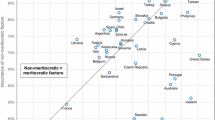Abstract
This paper develops an interpretation and analysis of the arguments for public education which open Book VIII of Aristotle's Politics, drawing on both the wider Aristotelian corpus and on examination of continuities with Plato's Laws.
Part II: Sections IV–VII examine the arguments for the first of the two conclusions which Aristotle advances in VIII. 1, namely that education is important enough to merit the legislator's attention. It is shown, through a development of links between Politics V and the arguments of VIII. 1, that Aristotle's two arguments for this conclusion are calculated to appeal to two distinct subgroups within his intended audience, those who would be moved by a desire to promote the common good, and those who could only be counted on to desire the preservation of their own rule.
Similar content being viewed by others
References
Adkins, A.W.H.: 1967, ‘Polupragmosune and “Minding One's Own Business”: A Study in Greek Social and Political Values’, Classical Philology 71, 301–327.
Barnes, J. (ed.): 1984, The Complete Works of Aristotle: The Revised Oxford Translation, Princeton University Press, Princeton.
Finley, M.I.: 1983, Politics in the Ancient World, Cambridge University Press, Cambridge.
Jaeger, W.: 1948, Aristotle: Fundamentals of the History of His Development, trans. R. Robinson, 2nd. edn., Clarendon Press, Oxford.
Keyt, D. and Miller, F. (eds.): 1991, A Companion To Aristotle's Politics, Blackwell, Oxford.
Lord, C. (trans.): 1984, Aristotle: The Politics, University of Chicago Press, Chicago.
Mulgan, R.G.: 1977, Aristotle's Political Theory, Clarendon Press, Oxford.
Newman, W.L.: 1902, The Politics of Aristotle, Clarendon Press, Oxford.
Patzig, G. (ed.): 1990, Aristotles' ‘Politik’, Vandenhoeck & Ruprecht, Göttingen.
Polansky, R.: 1991: ‘Aristotle on Political Change’, in Keyt and Miller, pp. 323–345.
Ross, W.D. and Urmson, J.O. (trans.): 1984, Nicomachean Ethics, in Barnes, pp. 1729–1867.
Rowe, C.: 1991, ‘Aims and Methods in Aristotle's Polities’, in Keyt and Miller, pp. 57–74.
Sabine, G.H.: 1973, A History of Political Theory, 4th edn., Dryden Press, Hinsdale, Illinois.
Author information
Authors and Affiliations
Rights and permissions
About this article
Cite this article
Curren, R.R. Justice, instruction, and the good: The case for public education in Aristotle and Plato's Laws. Stud Philos Educ 12, 103–126 (1993). https://doi.org/10.1007/BF00468836
Issue Date:
DOI: https://doi.org/10.1007/BF00468836




